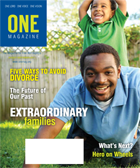
August-
September 2011
Extraordinary
Families
E-Reader
About ONE
----------------------
|

intersect, where the bible meets life
E-Readers Must Be Readers
Shock. Heartbreak. Grief. “This can’t be happening.” I found myself in denial as I read the headline. Our local bookstore—my favorite hangout—had filed for bankruptcy and would soon close. No more chilling on the comfortable sofas skimming the latest bestsellers or meeting favorite authors at book signings.
Experts are confirming what I had feared: we are no longer a print culture. My bookstore found that out the hard way. Image now rules. Books as we know them are an endangered species—maybe. I’m a holdout, though.
E-Books and THE Book
I have nothing against e-books, mind you. Kindle®, Nook®, SonyReader®, and all the others pose no threat to this non-techie. I do spend a lot of time online and confess to minimal social networking, however. Some of my family and friends do the e-book thing; I’m delighted they enjoy that. But cuddling up with a nice screen offers no appeal to this bibliophile.
With that disclaimer on the table, I offer my real concern about where our culture—especially our Christian culture—is headed with regard to books and reading. When we neglect the larger world of reading in general, neglecting THE Book, the Bible, naturally follows, particularly in an increasingly secular culture.
My evidence for that conclusion is largely based on experience and observation, I admit. After 30 years of teaching college students, more and more of them confess that they don’t like to read, period. They also let me know that they don’t read the Bible that much, either. The rate of biblical illiteracy today is staggering; dozens of studies support that fact.
Three Reasons
While there may be many reasons for this tragic and dangerous trend, I suggest only three here. The first may surprise you, and I’m not sure I can prove it. I fear that despite the benefits offered by reliable, modern translations of the Bible, the sheer number of translations on the market may be a hindrance to the church’s collective familiarity with Scripture. The recognition factor of familiar phrases and verses when one version was the standard now seems minimal across the evangelical church community. That situation may or may not squelch interest in Bible reading. I suspect it does, though.
Another factor contributing to the increasing neglect of reading Scripture is the decline of reading across the board. One recent Survey of Public Participation in the Arts notes a 17-percentage point downturn in reading among 18 to 24-year-olds from 1982 to 2002. People read fewer books now. They more often surf and skim quickly online to find what they want, then move on. Anyone who reads mystery novels knows that more authors are responding to this trend by writing short chapters.
The third and, to me, most significant reason why more people struggle with serious Bible reading involves the nature of e-reading. Nicholas Carr and others contend that increased time online and reading screens actually re-routes our brain circuitry. We become accustomed to snippets of texts and short bits of data. Searching and hyperlinking distract our attention and reduce concentration.
In the early days of books, readers learned to follow an extended line of thought through a succession of pages. As one writer puts it, however, “thinking substantively in a sound bite culture” is tough to do. What e-readers want is a wide variety of info delivered with speed and connectedness on screen. With this “power browsing,” the net grabs our attention only to scatter it quickly.
We Need to Read!
To be sure, it takes time to read Scripture thoroughly and carefully. But not as much time as you may think. An average reader can read the book of Judges in an hour-and-a-half, Ecclesiastes in half-an-hour, Jonah in seven minutes, Hebrews in 45, and First Corinthians in 40 minutes. He can read the entire New Testament in only 16 hours, and the whole Bible in 72 hours of steady, concentrated reading.
To paraphrase Paul, trusting God comes through knowing God, and knowing God comes through reading God’s Book. I’m all for studying the Word, whether it’s on a page or online; whether I’m on a beach or a bus, in the mood or out of sorts. We need to read! God’s people must follow the example of the Berean Christians in Acts 17 who investigated the Scriptures closely. Learn the details—the stories, verses, and concepts of the Bible. But master the big picture, too—the sweeping storylines that portray God’s work in human history as He revealed it in words. As Eugene Peterson exhorts, we should hold out for “traveling widely in Holy Scripture.”
In truth, one of the most evident ways we love our God is our taking the time to read carefully what He tells us.
Intersect (Where the Bible Meets Life) is a regular column of ONE Magazine featuring Dr. Garnett Reid, a member of the Bible faculty at Free Will Baptist Bible College. Email Garnett greid@fwbbc.edu
|
|

